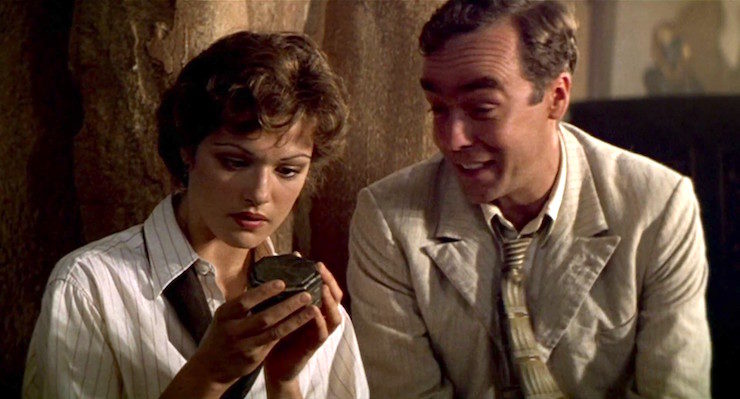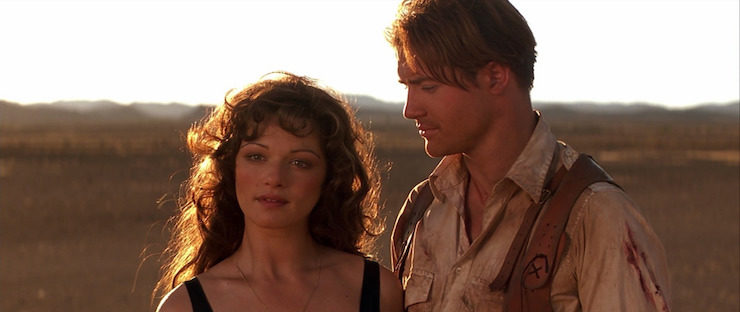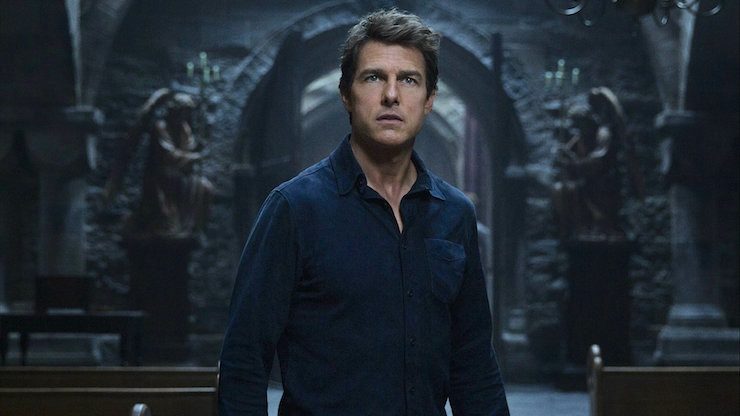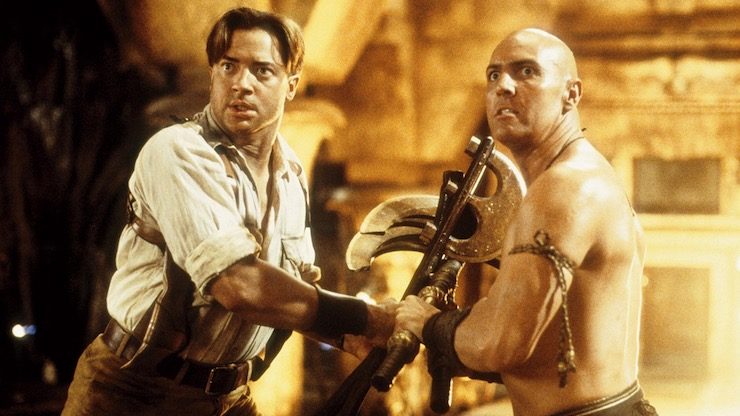The Mummy is one of those monsters you just can’t keep down. The original Universal Monsters series of films ran from 1932 to 1955 and less than a decade later the bandaged one rose again, this time on the other side of the Atlantic. The Hammer series initially riffed off of Universal’s The Mummy’s Hand and The Mummy’s Tomb but soon became their own shambling, unkillable beast, and like all Hammer flicks the worst they ever get is still pretty fun. They’re no Captain Kronos, Vampire Hunter but then again, what is? Clive Barker even took a run at bringing the Mummy back to life but it never quite came to fruition. There’s a whole book to be written about Barker’s near-misses with horror franchises but his take on The Mummy is the one I’d honestly most like to have seen. Being Barker, the approach to the material would have been violent and sexy and “would have been a great low-budget movie,” in his own words. There’s an excellent Cinescape article that covers the never-made Barker film in their May 1999 issue.
Instead of Barker’s version, though, we eventually got a loose remake of the 1932 original, written and directed by Stephen Sommers in 1999. The Mummy and its sequels, The Mummy Returns and (perhaps to a lesser extent) Tomb of the Dragon Emperor helped to set the early 21st century’s gold standard for action cinema.
The reason for that is simple: these movies are FUN. They follow Evie and Jonathan Carnahan, a pair of orphaned siblings who’ve approached life in 1926 Egypt in VERY different ways. Jonathan is boozing and tomb-robbing his way to a fortune and Evie is intent on becoming the first woman recognized as a scholarly authority on Egyptian studies. Jonathan presents Evie with a box he…found. The journey to decipher its secrets leads them to Hamunaptra, the City of the Dead, and the terrible curse placed upon the ancient high priest Imhotep centuries ago. A curse they are about to unintentionally lift…

So far so Indiana Jones-without-the-whip, I know, but what makes these movies truly brilliant are the characters. Rachel Weisz, and later Maria Bello, play Evie as a glorious combination of turbo-charged Egyptology nerd, intensely proper upper class English woman, and fierce two-fisted ninja. The second film makes it explicit that Evie is a reincarnation of a figure from Imhotep’s time and may be destined to act as the final line of defence against him. Which, in any other movie series, would play out as a cheesy excuse to have your female lead engage in some unusually acrobatic martial arts.
Here? It’s also a cheesy excuse to get your female lead engage in some unusually acrobatic martial arts. But it isn’t ONLY that.
Instead, this revelation gives Evie a surprisingly nuanced and interesting character arc as she grows first into her role as a scholar and then blows past it, into new territory. Instead of trying to play the game that her country and era has set out for her, Evie plays by her own rules and that leads her to some really interesting places. There’s plenty of hints in 2008’s Tomb of the Dragon Emperor, for example, that she and Rick (oh, we’ll get to Rick) worked special intelligence missions during the war. (In my mind they did this with Atomic Robo, Doctor Henry Jones Junior, and, on occasion, Hellboy.)

Regardless, Evie’s transformation feels hard fought for and well earned. One of the single most affecting moments in the franchise occurs towards the end of The Mummy Returns, when the very fact that she has a family and people who care for her gets her killed: distracted by the realization that Rick and their son are alive, Evie is stabbed and bleeds to death.
Her death devastates everyone. Rick in particular, all 6’3” of him, just collapses over her, sobbing in a way that’s about as un-blockbuster as you can get, in terms of drama. It’s a complex, poignant scene, and it makes clear both that Evie is more than just her past self, and that she’s had to pay a heavy price for her life and choices.
It also gives the movie a great ticking clock to race against as they work out how to resurrect her (Spoiler: they win. Yay!)—but the emotional content is what stays with you.
The reason for that, oddly, is wrapped up in her brother. Jonathan, played with colossally charming rubbishness by John Hannah, is not good—at anything, in any sense, besides surviving. Not brave enough to be a treasure hunter, not rich enough to be a gambler, he charms his way across Egypt and always looks out for number one. He’s flawed, and knows it, and keeps going anyway because that’s what underdogs do.
And that’s what these characters are. Even with Evie’s Egyptian princess ninja skills cropping up in the later movies there’s no hint, at any point, of these folks being unkillable or a sure bet to win. They all screw up, they all make truly spectacular mistakes, and they all take their lumps getting to the end of the movie. That doesn’t just make them relatable, it makes them sympathetic—and that may be the key factor that the new version of The Mummy hasn’t carried through.

When we first talked about this piece, the Tor editorial team brought up the importance of the underdog theme, and I really responded both to that and to its apparent absence from the new version. In every trailer we’ve seen, the lead in the new version looks and behaves exactly like Ethan Hunt of the Mission: Impossible franchise—there’s the same relentless competency, the same grim demeanour at times, and the same sense of Nick Morton being another slightly by-the-numbers Tom Cruise action hero going through the motions.
If so, that’s bad for two reasons. The first is that Cruise is capable of SO much more as an actor in action films, as Edge of Tomorrow and the later Mission: Impossible movies demonstrate. The second is that, with a bulletproof action man in the lead, you don’t just lose the underdog factor—you replace Rick O’Connell with a lesser model. And nobody puts Rick O’Connell in the corner.
Seriously, he’s 6’3”. He’s not going in any corners he doesn’t want to be in.
Rick O’Connell represents Brendan Fraser’s finest hour. He’s also the great spiritual successor to Indiana Jones (though he doesn’t get the acknowledgement he deserves, for the most part). Rick tends to favour firearms over bullwhips, but the two men have a lot in common. There’s the same bruised fortitude, the same refusal to stay down, and the same near total absence of luck except when absolutely needed. The best way to understand Rick is this: Remember the look on Indy’s face in the famous scene in Raiders? With the big guy who’s all ready for an epic sword fight? And Indy just shoots?
That’s the essence of Rick.

(And yes, I know the reason why that scene happened that way was that Ford was ill. The character beat still stands.)
Brendan Fraser’s endlessly laconic, long-suffering O’Connell is a joy. Even in the third, notably less impressive movie, his combination of puppy-like enthusiasm, comic timing, and physical bulk is relentlessly endearing.
Better still, Rick and Evie are one of genre cinema’s great overlooked teams. Time and again they help each other out in a manner that’s refreshing in its complete equality. Look at the moment in The Mummy in which Evie drags a preoccupied Rick out of the way of a bullet. Or the moment in The Mummy Returns where Rick saves Evie from being sacrificed. These two are on exactly the same page almost all the time, and the rare times when they aren’t make for some of the movies’ best moments. Rick’s heroic destiny is hinted at while Evie’s is explicitly detailed and that subtle shift in focus really helps The Mummy Returns along. It’s not even that there isn’t a damsel in distress—it’s that sometimes that damsel is Evie, and sometimes it’s Rick.
But you can’t talk about the characters in these movies without discussing Oded Fehr. As Ardeth Bay, the head of the Medjai (the order dedicated to guarding the tombs and stopping people from raiding them), Fehr is amazing. He’s got natural screen presence, tremendous comic timing, strong action chops, and is phenomenally good looking. This series should have been Fehr’s career-making turn and instead he was condemned to years of playing terrorists (and Carlos, brilliantly, in the Resident Evil franchise). In a fairer world? Fehr would have been Doctor Strange (perhaps taking turns with Oscar Isaac), but at least we got his turn as Bay in these movies.

Those four characters are so fundamentally charming, and so banged-up, bloody-knuckled, and crumpled from their adventures that you can’t help but root for them. They’re the key to the series’ success, although Arnold Vosloo’s tragic and monstrous Imhotep is also impressive. Together, they give the Mummy movies an emotional core that’s sweet, funny, and tough. And that’s what makes these films so much fun to watch, even now.
They aren’t perfect, of course. Omid Djalili as Warden Gad Hassan is saddled with a character who’s so grotesquely stereotypical the film drops 20 IQ points every time he’s on screen. It’s especially a shame as Djalili is a fiercely smart, very funny stand-up comedian, and both the role, and he, deserved much better than what they got. Likewise, the version of Egypt we see is resolutely stereotypical, albeit with some nice touches. For example, Erick Avari, a veritable genre staple at this point his career, shows up as a Medjai who fights the war on a very different front. Likewise, the scattered remnants of various aviation corps are a common feature through the series. Through them, and Rick, you get a nicely-handled hint of the atmosphere of moral ambiguity filling the years between the World Wars—a grey area where treasure hunters can make a fortune, unearth an ancient evil, or throw a cat at a mummy. Perhaps even all three at once.
Charm, wit, jokes, and scrappy underdogs just trying to make a living make these movies as good as they are. A frankly horrifying amount of time has somehow passed since they were originally released, and they’re still immensely fun. Clearly it’s their shadow (much more than the earlier, “classic” iterations of the monster and story) that the new “Dark Universe” version of The Mummy needs to live up to, or surpass. Launching a shared universe is a massive undertaking, and at least according to the most recent buzz, the 2017 The Mummy certainly looks bowed under the weight of fan expectations. Here’s hoping the newest Mummy gets to have a little fun as well…or at least make sure it’s on the right side of the river.
Alasdair Stuart is a freelancer writer, RPG writer and podcaster. He owns Escape Artists, who publish the short fiction podcasts Escape Pod, Pseudopod, Podcastle, Cast of Wonders, and the magazine Mothership Zeta. He blogs enthusiastically about pop culture, cooking and exercise at Alasdairstuart.com, and tweets @AlasdairStuart.










